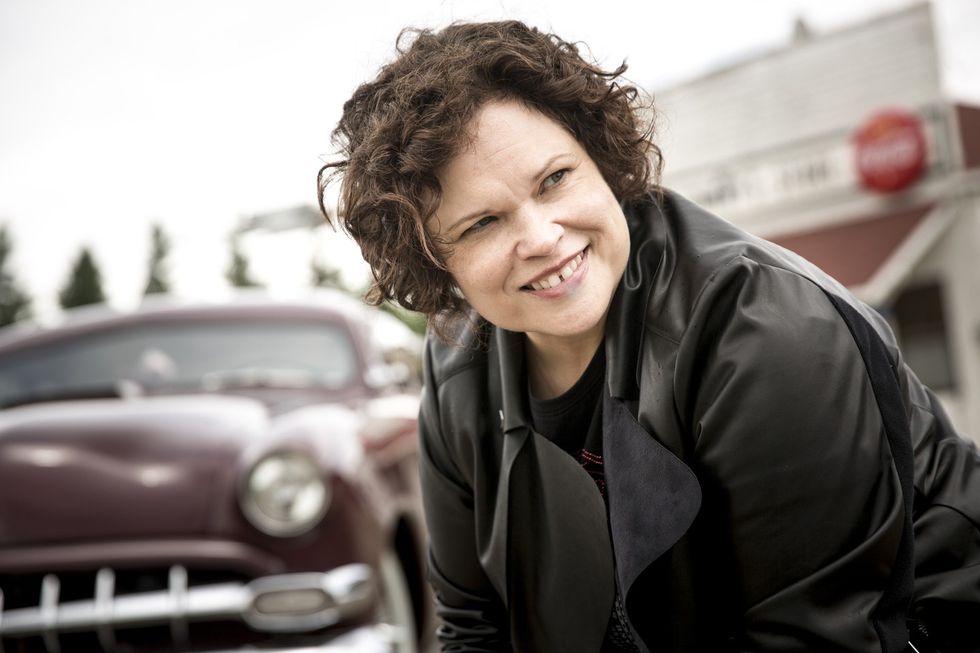Five Questions With… Kat Danser
Edmonton's Kat Danser doesn't just play the blues—she studies it, lives it, breathes it and elevates it from sweaty, smoky beer joints to elegant centre stage in the finest of concert halls.

By Jason Schneider
Edmonton's Kat Danser doesn't just play the blues—she studies it, lives it, breathes it and elevates it from sweaty, smoky beer joints to elegant centre stage in the finest of concert halls. Her fifth album, Goin’ Gone, is a collaboration between Danser and Juno-winning producer Steve Dawson and is available now on Black Hen Music, distributed by True North Records.
A highly energetic collection, Goin’ Gone plays like a ride through America’s Deep South, showcasing Danser’s vocal and instrumental prowess, along with the sharp wit and commanding personality that fans have come to expect from her live performances. Like a steel-belted radial flexing between a dusty gravel road and a fresh coat of asphalt, Danser’s music combines swampy roots with finely honed life lessons from the road.
It also celebrates her passion for blues history, which led to her achievements as a graduate student at the University of Alberta where she has now officially become Dr. Kat Danser with a PhD in Ethnomusicology. By extension, Danser’s primary goal is to use music as a space for personal exploration and as a method to strengthen intercultural relationships.
For more info and gig updates, go to katdanser.com.
What makes Goin' Gone stand apart from your previous work?
I believe it’s my very best songwriting. We captured the essence of acoustic blues, modernizing the sounds of the past without sacrificing its authenticity.
What songs on the record are you most proud of and why?
My producer Steve Dawson and I are both really excited about the album’s overall travel vibe, but a few songs in particular stand out. The title track is an upbeat ode to the Mississippi Delta, which is where my soul lives. “Voodoo Groove” was written about a real life juke joint experience in North Mississippi with the legendary Kimbrough, Burnside, and Hemphill families, and “My Town,” which is the most musically sparse track on the album. The arrangement really reflects the emotions I carry from growing up in small town in Saskatchewan where family violence against me and my brother and sister were known to the townspeople and ignored completely. We suffered greatly. It takes a village to stand against violence against children. Unfortunately, our village did not stand. Then there’s “Chevrolet Car,” which is an old Sam McGhee song that I grew to love as I completed my PhD in Music. My focus was on string band music from the 1920s to 1950s, and for the album I wanted to re-vamp an old song that conveyed lot of humour and lightness. This song makes me smile.
How would you describe your artistic evolution so far?
It’s been consistently centered on creating a gumbo of blues sounds. I have used blues music to heal my life and to help me find the immense joy in it. In that way, my lyrics have grown more poetic as has my groove and songwritiong sensibilities. Authentic representation is critical as an honour to my Mississippi mentors and to my own life story. I continue to learn from those of us who love the blues. This album ushered in a new artistic energy and the desire to form my first band, Kat Danser & The Tall Tales. I have played with side musicians before but never as a cohesive group.
What's been the biggest change in your life over the past year?
I have had one heck of year! I lost 130 pounds, competed in obstacle course races, had three surgeries, begin raising our first puppy, and completed my doctoral dissertation.
If you could fix anything about the music industry, what would it be?
In terms of roots and blues music, my experience after 20 years is that we need to find a way to open the black-white divide in the blues. Consistently, folks focus so much on the origins that we have not found a way to modernize inclusivity. The truth is, based on my years of research on the subject, the blues was born through ethnic, racial, and cross-cultural musical creativity.
There also needs to be more progress on gender equality. There are some really amazing women in the blues receiving a whole lot of recognition right now and this is super exciting. Still, women performers in the blues remain largely under-represented. If you look at a cross section of roots and blues festivals across Canada, there is generally one female blues artist for every ten male artists. This is not okay and it needs to be changed.
The last thing that bothers me is when folks hear a new young artist and say, “Wow, are they great!” Truth is, they are not great and telling them that at too young or an age can hinder their growth as an artist and as a person. Copying licks and lyrics from the past is not greatness. We need to encourage young artists to find their own voices and offer mentorships; not inflated ego stroking. Blues is one of the music forms where, like fine wine, the older you get, the clearer your voice is. Let’s work toward identifying mentors for new artists and recognize the greatness in those who are able to communicate the blues because they have lived it.

















